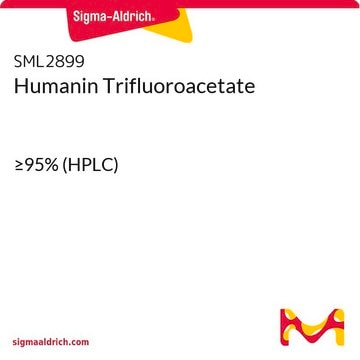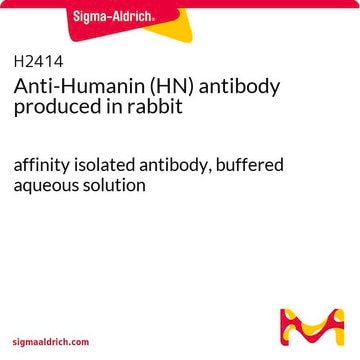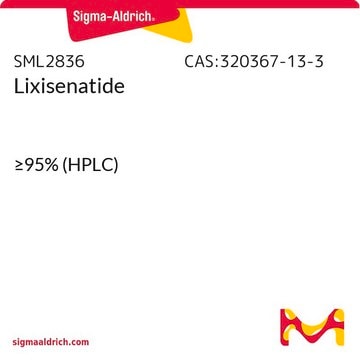H6161
[Gly14]-Humanin G human
≥95% (HPLC), powder
Synonym(e):
S14G-humanin, HNG
About This Item
Empfohlene Produkte
Biologische Quelle
human
Qualitätsniveau
Assay
≥95% (HPLC)
Form
powder
Mol-Gew.
2654.2-2660.2 Da
Lagerbedingungen
(Keep container tightly closed in a dry and well-ventilated place)
Methode(n)
activity assay: suitable
Löslichkeit
water: 1.00-1.04 mg/mL, clear, colorless
Versandbedingung
dry ice
Lagertemp.
−20°C
Amino Acid Sequence
Allgemeine Beschreibung
[Gly14]-humanin (HNG) belongs to the family of mitochondrial-derived peptides. HNG (humanin-G) is an analog of humanin, generated by S14G (serine-14-glycine) mutation. HNG shows a 1000 times stronger activity.
Anwendung
- along with bortezomib in pharmacological inhibition studies to treat mice to limit the toxic effects of bortezomib
- to study its effect on high glucose (HG)-induced apoptosis of endothelial cells (ECs)
- to study its neuroprotective effects in an in vitro oxygen-glucose deprivation/reoxygenation (OGD/R) model using SH-SY5Y neuroblastoma cells
Biochem./physiol. Wirkung
Antikörper
Lagerklassenschlüssel
11 - Combustible Solids
WGK
WGK 3
Flammpunkt (°F)
Not applicable
Flammpunkt (°C)
Not applicable
Persönliche Schutzausrüstung
Eyeshields, Gloves, type N95 (US)
Analysenzertifikate (COA)
Suchen Sie nach Analysenzertifikate (COA), indem Sie die Lot-/Chargennummer des Produkts eingeben. Lot- und Chargennummern sind auf dem Produktetikett hinter den Wörtern ‘Lot’ oder ‘Batch’ (Lot oder Charge) zu finden.
Besitzen Sie dieses Produkt bereits?
In der Dokumentenbibliothek finden Sie die Dokumentation zu den Produkten, die Sie kürzlich erworben haben.
Unser Team von Wissenschaftlern verfügt über Erfahrung in allen Forschungsbereichen einschließlich Life Science, Materialwissenschaften, chemischer Synthese, Chromatographie, Analytik und vielen mehr..
Setzen Sie sich mit dem technischen Dienst in Verbindung.




![[Nle4, D-Phe7]-α-Melanocyte Stimulating Hormone trifluoroacetate salt ≥95% (HPLC)](/deepweb/assets/sigmaaldrich/product/structures/276/187/9733edf4-6412-4f2b-8cc6-c3f9f3425d4d/640/9733edf4-6412-4f2b-8cc6-c3f9f3425d4d.png)



